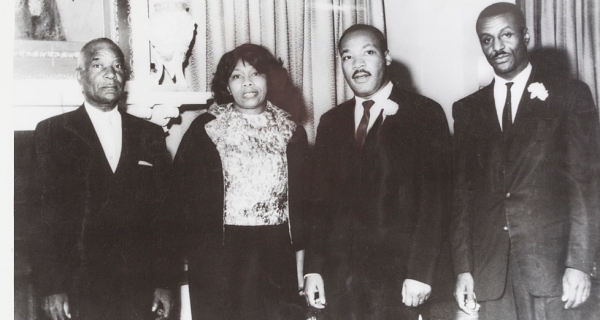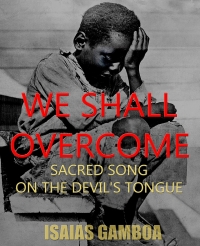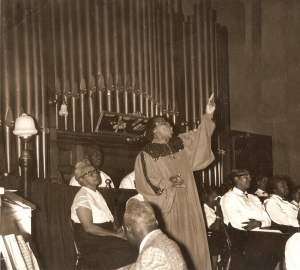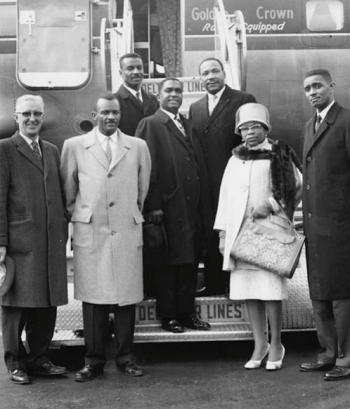A leading lady with a leading voice
Discover the history of Louise Shropshire, the Cincinnati woman, activist and black gospel composer now credited with writing one of the most inspirational songs of the 20th century
By Dawn Fuller
Louise Shropshire’s best-known composition, “If My Jesus Wills,” was copyrighted in 1954 and was adapted by the Rev. Martin Luther King Jr. to unite the voice of the Civil Rights Movement. Her work would later be linked to the famous song "We Shall Overcome."
Shropshire's lyrics read, “I’ll Overcome, I’ll Overcome, I’ll Overcome Someday – If My Jesus Wills, I Do Believe, I’ll Overcome Someday.” The song, “We Shall Overcome,” however, never was credited to the original composer.
“The melodies are different because her song was a choral arrangement,” explains Isaias Gamboa, author of “We Shall Overcome – Sacred Song on the Devil’s Tongue" (2012).The book traces the history of Shropshire’s original choral composition. “The song ‘If My Jesus Wills’ was very popular and was sung all over the country at the time, and there were cities that had different iterations of the song,” says Gamboa.
The Shropshire collection, a recent donation to the University of Cincinnati, holds sheet music, letters, family memorabilia and photos of Louise Shropshire standing as the lone woman in groups of prominent male civil rights activists, including the Rev. Martin Luther King Jr., the Rev. Fred Shuttlesworth, the Rev. Maurice McCrackin and the Rev. Venchael L. Booth, UC’s first black Board of Trustees member.
Other photos depict her passion and dedication to the church, including a photo of her directing the choir at Revelation Baptist Church in Cincinnati, accompanied by the Rev. Thomas A. Dorsey, known as “the father of black gospel music.”
Gamboa notes that Rev. Martin Luther King Jr. requested that Dorsey’s song, “Take My Hand Precious Lord,” be sung at King’s funeral. Louise Shropshire co-wrote a song with Dorsey, titled “Behold the Man of Galilee.”
“Her connection with Thomas A. Dorsey ushers in a whole new era of gospel music,” says Eric Abercrumbie, UC executive director of diversity and community relations. "It becomes more upbeat. It moves away from the hymn-style of music and that was very controversial, because many black people felt the music was too 'clubby.'"
Born the daughter of Alabama sharecroppers and the granddaughter of slaves, Gamboa says Louise Shropshire moved to Cincinnati in 1917 and spent much of her life in the Queen City before moving to California to be with her ailing mother in 1967. Her husband, Robert Shropshire Sr., ran a successful bail-and-bonds business, which Louise also turned to when raising funds to bail out fellow activists jailed for civil disobedience. The family business remains in operation in Cincinnati.
“So, the collection is not just about the song, but also about her life and the most influential civil rights activists that she called her friends," says Gamboa. "It’s an extraordinary body of work that I liken to King Tut’s tomb. I think little by little, the world will start to recognize what is here. She was a woman in her day who was one of the unsung heroines of the church during a period when you only heard about the contributions of men.”
Abercrumbie says UC serves as the appropriate home to make the collection widely available to scholars. Richard Anthony Goins, the son-in-law of Louise Shropshire, is a UC alumnus. Gamboa says Goins’ son and Shropshire’s grandson, Robert Goins Shropshire, first approached Gamboa about tracing the Shropshire contribution to “We Shall Overcome.”
“As far as African-American history is concerned, this collection is the Holy Grail of gospel music,” says Gamboa. “The university and its setting near the Ohio River and the National Underground Railroad Freedom Center make UC a sweeter place for its home.”
Because of her dedication to furthering civil rights, Shropshire will be inducted into the Ohio Civil Rights Commission Hall of Fame this fall. The ceremony takes place Oct. 2 in Columbus. The Ohio Civil Rights Hall of Fame recognizes outstanding Ohioans who are pioneers in human and civil rights and who have advanced the goals of equality and inclusion.
Gamboa adds that “We Shall Overcome” is an anthem that is also passionately embraced to this day in India. He says Louise Shropshire would have marked her 101st birthday this year. She died in 1993 and is buried in California. Her brother, James "Pigmeat" Jarrett, was a longtime Cincinnati blues pianist and died in 1995 at the age of 95.
LINK:
Read more about the UC Louise Shropshire collection donated on Sept. 18, 2014



